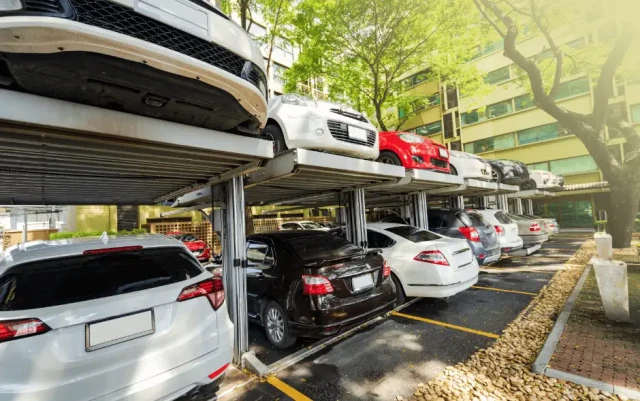The car parking industry is experiencing a significant change brought about by technological advancements and the ever-changing urban environment. This transformation is centred around the necessity to adjust to new circumstances, where the future of car parking structure goes beyond mere space and focuses on intelligent solutions.
The Car Parking Award (CPA) plays a significant role in shaping policy and practice, and its impact on the car parking sector is profound. It drives the industry towards a more efficient, sustainable, and user-friendly future.
What is the car parking award (cpa)?
The Car Parking Award (CPA) is significant in Australia as a regulatory framework. Its primary objective is to bring uniformity to employment conditions within the car parking industry. This section offers a comprehensive overview of the CPA, emphasising its purpose, key regulations, and standards.

Purpose of the cpa:
- Standardisation of Employment Conditions: The CPA strives to establish consistency in employment conditions throughout the car parking industry, guaranteeing fair treatment for all employees.
- Protection of Employee Rights: It ensures that employees are treated fairly by setting out rules about how much they should be paid, how many hours they should work, and what other terms and conditions should apply to their employment.
- Facilitation of Fair Work Practices: The CPA upholds ethical standards and fairness in the industry, preventing exploitation and ensuring that everyone follows the rules the country sets.
Key regulations and standards:
- Wages and Salaries: The CPA sets out the minimum wage rates in the car parking industry. This guarantees that every employee is fairly paid for their efforts.
- Work Hours and Overtime: Specific regulations exist to avoid excessive workloads and ensure fair compensation for additional hours worked. These regulations define standard work hours, overtime rules, and penalty rates.
- Leave Entitlements: The CPA provides employees with a range of leave options, including annual leave, personal leave, and long service leave.
- Workplace Safety: The CPA, along with Safe Work Australia, sets workplace health and safety guidelines to ensure employers offer a secure working environment.
- Dispute Resolution: Within the CPA, there is a structured method for resolving disputes between employers and team members to foster amicable solutions and ensure workplace harmony.
Compliance and enforcement:
- Monitoring and Audits: Regular audits are performed to ensure the CPA is followed. Employers must abide by the standards and regulations in the award.
- Penalties for Non-Compliance: Employers who do not follow the CPA may be subject to penalties such as fines and legal consequences. This enforcement system ensures the rules are respected and followed.
By complying with the CPA, individuals in the car parking industry can promote a work environment that is fair, safe, and conducive to productivity.
Technological advances in the car parking sector
The world of car parking is changing rapidly thanks to new technologies. These advancements make parking easier, more convenient, and aligned with industry standards like the Certified Parking Professional (CPP) and Certified Parking Administrator (CPA) programs. Let's take a look at some of the key innovations that are reshaping the industry.

Automated parking systems (aps):
- Space Utilisation: APS optimises parking facilities by arranging cars in vertical and horizontal stacks, allowing more vehicles within smaller parking lots.
- Speed and Convenience: These systems help drivers save time by finding a number of parking spaces, improving the user experience.
- Safety: Automated systems play a crucial role in preventing accidents by decreasing the likelihood of human mistakes while parking.
- Environmental Impact: Lowering the time that vehicles idle can positively impact reducing carbon emissions, ultimately supporting green initiatives.
- CPA Standards Alignment: APS guarantees that space is used efficiently and operations run smoothly by CPA standards for top-notch performance.
Digital payment solutions:
- Contactless Payments: The incorporation of contactless payment methods, such as RFID and mobile wallets, enables quick and sanitary transactions.
- Mobile Apps: These easy-to-use apps allow users to book, navigate, and make payments all within a single platform, guaranteeing a high level of convenience.
- Dynamic Pricing: Real-time pricing adjustments are made based on the demand, which helps to maximise revenue generation.
- Secure Transactions: Advanced encryption and security protocols safeguard user data and financial information.
- Operational Efficiency: Streamlined payment processes are designed to make things more efficient and save time.
License plate recognition (lpr) systems:
- Seamless Entry and Exit: LPR technology allows automatic entry and exit, decreasing waiting time.
- Enhanced Security: Vehicle security can be significantly improved by utilising real-time monitoring and tracking systems.
- Data Analytics: Gathering information on parking experience and habits helps us understand how to make smarter choices and allocate resources more effectively.
The latest advancements in car parking adhere to CPA standards and significantly improve efficiency and customer satisfaction in the industry.
How the cpa drives workforce changes
The Car Parking Award (CPA) has brought about essential transformations in the parking industry, especially in how businesses handle employees. Let's explore how the CPA is reshaping the industry and discover what small businesses can do to ensure compliance and cultivate a harmonious work environment.

Impact of the cpa on workforce management:
1. Enhanced staffing protocols:
- Compliance Checkpoints: Businesses must introduce stricter compliance checks to ensure all employees meet the CPA standards.
- Flexible Scheduling: Adapting to shifting parking demands and ensuring that all employees comply with regulations on working hours.
2. Training and development:
- Mandatory Training Programs: The CPA program mandates specialised training courses for all parking personnel. These modules primarily emphasise the importance of safety, customer service, and compliance.
- Continuous Professional Development: Employees should learn to stay current with industry standards and CPA regulations.
3. Employee well-being:
- Health and Safety Regulations: Prioritise the well-being of employees. One way to achieve this is to strictly follow safety regulations and ensure that all necessary protective equipment is provided.
- Mental Health Support: Creating initiatives focusing on employees' mental well-being is crucial to establishing a supportive work environment.
Adapting to cpa workforce compliance:
1. Regular audits and feedback:
- Internal Audits: Conduct frequent audits to verify compliance with CPA regulations and pinpoint areas for improvement.
- Employee Feedback Mechanisms: Establish channels for staff to provide feedback on compliance practices and workplace conditions.
2. Technology integration:
- Automated Systems: Enhance your operations by investing in automated systems that can help simplify compliance checks and keep track of training records efficiently.
- Mobile Training Apps: Use mobile apps to offer accessible training sessions for your employees, allowing them to learn on the go.
3. Clear communication:
- Policy Updates: It is crucial to ensure that your staff is well-informed about any alterations to CPA regulations and their potential impact on our daily operations.
- Transparent Guidelines: Convey and provide easy access to all compliance guidelines for every employee to guarantee that all individuals comprehend and can conveniently refer to the required guidelines.
Adapting to the workforce changes brought about by the CPA can benefit small businesses in maintaining compliance and fostering the growth of their employees. Taking a proactive approach can result in a more efficient and supportive workplace.
Challenges and opportunities
Effectively managing the parking industry demands thoughtful strategic planning, especially when confronted with shifting challenges and new possibilities. Here, we highlight critical issues and their potential for advancement and progress.

1. Adapting to new regulations
- Challenge: Staying updated with the constantly evolving local and national regulations can feel overwhelming.
- Opportunity: By embracing changes in rules, companies can establish themselves as leaders in their industry by adhering to the highest standards.
2. Integrating technology
- Challenge: Implementing advanced technologies such as automated payment systems, smart parking sensors, and mobile app integrations requires technical expertise.
- Opportunity: These technologies make things run smoother, cut down on costs, and make customers happier by providing convenience and instant updates on availability.
3. Urbanisation and space management
- Challenge: Urbanisation is rising, so more people are moving to cities. As cities become more crowded, there is a greater need for parking spots.
- Opportunity: Advanced solutions like automated car parking systems and parking garage optimisation strategies are designed to optimise available space, meet increasing demand, and maximise revenue for the long term.
The parking industry is rapidly changing due to technological advancements and the implementation of CPA. Small business owners can take advantage of these changes to find new opportunities for growth and efficiency. By incorporating smart parking solutions, businesses can streamline operations and improve customer satisfaction. Embracing these innovations is critical to building a future that is both sustainable and profitable. Small businesses can navigate the ever-changing industry by taking proactive measures and adopting new regulations and modern parking technologies.



